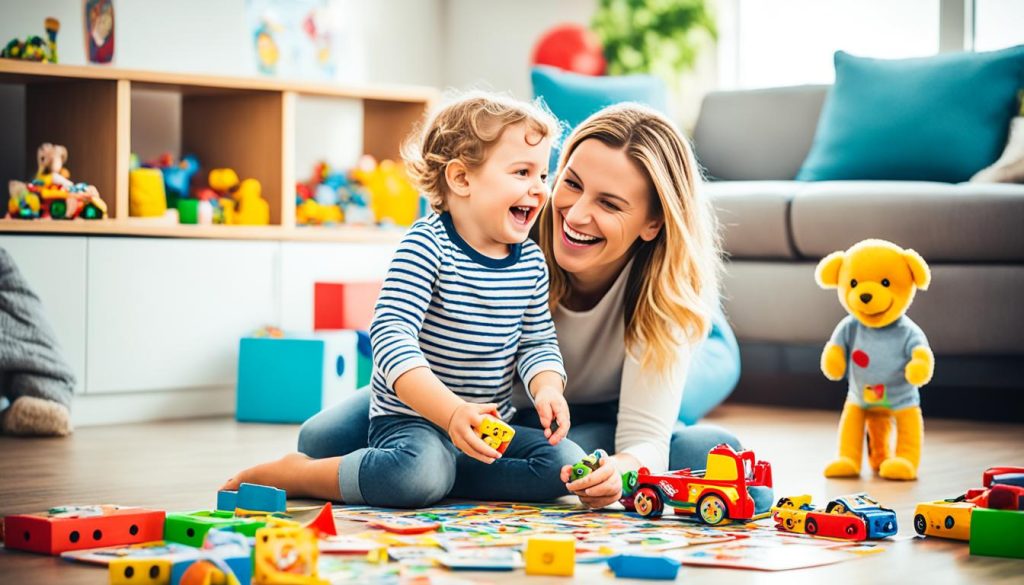Imagine a world where every morning starts with warm hugs, where eye contact is deep, and smiles are common. Being a parent is a unique journey filled with joy, challenges, and deep feelings. The bond you build with your child is key to their security, love, and trust. Paige Dorn, LCSW, says this bond shapes how your child sees the world and affects their safety and emotional smarts.
Parenting is a big task, but focusing on building a strong bond with your child is key. Using positive parenting methods like showing love, spending quality time, and setting clear rules helps a lot. Science shows that touch, kind words, and honest talks are important for raising emotionally smart kids.
Key Takeaways
- Greeting children with warm expressions and eye contact is crucial for fostering a strong parent-child bond.
- Regularly saying “I love you” has a lasting positive impact on children’s emotional growth.
- Establishing boundaries and setting rules provides essential structure and guidance.
- Quality time, even just 10 distraction-free minutes daily, is vital for nurturing communication and connection.
- Parent-child rituals and traditions can significantly enhance the bond and boost self-esteem.
Importance of a Strong Parent-Child Bond
A strong bond between parents and children is key for kids to learn and grow well. The bioecological model by Bronfenbrenner and Morris (2006) shows how important it is to understand how people and their surroundings interact. Belsky’s work in 1984 pointed out how different things affect how parents act.
Good relationships make kids feel loved and safe. Trust forms early, especially in the first three years, giving kids a sense of security. This helps them become resilient. The DC: 0-5TM model helps diagnose issues that might slow down a child’s growth.

Quality time, as Juffer et al. (2008) found, helps parents and kids connect better. It lets them share experiences and feelings, creating a caring space. Support and care build trust, which is key for kids to grow well, as seen by Hambrick et al. (2018).
Warm and caring interactions are the base of a child’s trust and safety. Cassidy et al. (2013) showed how attachment shapes a child’s life. Spending time together helps build trust and respect as kids grow. Clear communication and rules make this trust stronger, treating kids fairly.
A study by Ravn et al. (2011) showed early support is crucial for kids at risk. Slade (2005) talked about the importance of reflective functioning in parent-child relationships. Understanding and accepting your child’s feelings helps them feel secure and independent.
| Researcher | Key Contribution |
|---|---|
| Bronfenbrenner & Morris (2006) | Bioecological model of human development |
| Hambrick et al. (2018) | Examined relationships between adversity and developmental outcomes |
| Belsky (1984) | Highlighted factors influencing parenting behavior |
| Cassidy et al. (2013) | Attachment theory and patterns’ impact on development |
| Slade (2005) | Importance of parental reflective functioning |
| Juffer et al. (2008) | Promoted positive parenting through attachment-based intervention |
In conclusion, a strong bond between parents and children is vital for their growth and resilience. Warm and responsive interactions and quality time are key to building these bonds. They help kids develop well overall.
Show Your Love and Affection
Showing love and affection is key for a child’s growth. Simple actions like hugs and saying “I love you” strengthen the bond between parents and kids. This helps in raising kind children.
Physical Touch
Touching your child, like hugging or holding hands, is vital for their health. Most mothers show a good amount of affection, which is good for their babies. This kind of touch helps babies feel calm and sleep better.
Children who get massages feel less anxious when stressed. Showing love this way helps build a strong bond with your child. It sets the stage for good relationships and keeps them from mental health issues later.

Verbal Affirmations
Telling your child “I love you” often is important. A study found that kids who felt more loved as children grew up less likely to feel depressed or anxious. This kind of support helps raise kind, emotionally strong kids.
Being sensitive and positive with your child helps them do well in school and socially as adults. Kids who feel loved through words grow up to be well-adjusted and kind.
| Study | Findings |
|---|---|
| Maselko, et al. J Epidemiol Community Health. 2011 | Early child-parent attachment positively affects child’s mental health into adulthood. |
| Carroll, et al. PNAS. 2013 | Parental warmth in early childhood lowers risk of physical illnesses in adulthood. |
| Raby, et al. Child Development. 2015 | Early maternal sensitivity improves social and academic competence into adulthood. |
Showing love with both touch and words is key in parenting. By being loving and supportive, you teach kids to be grateful. This helps their mental and emotional health.
Effective Communication
Open, judgment-free talks between parents and kids build a strong bond. Holly Springs Pediatrics says this kind of talk is key. It makes the relationship stronger and teaches kids about talking in all parts of life. Talking well is key to helping kids get along with others and grow their minds.

When parents and kids talk well, they understand each other better. This helps share stories and learn from each other. Working together with parents and carers helps kids do better.
It’s important to respect different cultures, family setups, and life situations when talking. This makes communication work better.
“Listening actively enhances communication, providing detailed information about children and families. Open and honest communication with parents helps in sharing accurate observations and addressing sensitive issues.”
When parents and caregivers solve problems together, it helps fix issues. Checking in on concerns is key to seeing progress and making changes. Talking openly with parents about their worries helps find solutions together.
Studies show that talking well with kids makes them feel safe and close to their parents. Talking to babies from the start helps them grow. Spending time talking and listening, like during meals, makes the bond stronger.
- Turning off distractions like phones and TVs helps focus on talking.
- Talking about everyday things makes it easier to talk about big topics.
- Communicating openly about feelings helps kids learn new words for their feelings.
- Active listening shows kids you care and are interested, building a strong bond.
- Using active listening techniques like showing interest and understanding makes talking better.
- Being a good role model for talking well helps kids listen better.
- Providing simple and clear instructions that fit a child’s age helps them understand and cooperate.
| Statistics Data | Insights |
|---|---|
| Good communication with babies and children helps them feel safe and secure. | Strengthens relationships with parents or carers. |
| Conversations with newborns from birth. | Aids in skill development. |
| Setting aside communication time, such as family meals. | Enhances parent-child bonding. |
| Turning off distractions like phones and TVs. | Reinforces focus on the interaction. |
| Talking about everyday things. | Facilitates easier discussions on significant topics. |
| Communicating openly about feelings. | Helps children develop emotional vocabulary. |
| Active listening during communication. | Demonstrates care and interest. |
| Using active listening techniques. | Improves communication quality. |
| Being a good role model for communication. | Positively influences a child’s listening skills. |
| Providing clear instructions matching child’s age and ability. | Aids better understanding and cooperation. |
Quality Time Together
Spending quality time with your child is key for building strong bonds and their well-being. It’s not just about how long you’re together, but the quality of those moments. Activities that encourage Bonding Through Play make these moments special and deepen your connection. Knowing the Role of Play in Child Development helps make these times better.

Uninterrupted Presence
Being fully present when with your child is crucial. Put away your phone and focus on your time together. A study in the Journal of Marriage and Family shows that quality time has a big impact on kids’ success and happiness. Jessica Alvarado, an assistant professor at National University, says these moments should be simple and part of everyday life.
Sharing a meal or just playing can greatly help your child’s social and emotional growth.
Family Activities
Doing things together as a family strengthens your bond and helps kids learn for life. Let your kids help plan and join in on activities they like. For example, letting them help with meal prep teaches them important skills.
Planning family game nights or outdoor trips also boosts Role of Play in Child Development. It helps with teamwork and talking in the family.
Quality time isn’t about the amount of time (or money) you spend together; it’s about what you do together to create memories.
| Activity | Benefit |
|---|---|
| Cooking Together | Promotes Lifelong Learning in Children by teaching them valuable skills |
| Playing Games | Enhances Bonding Through Play and supports cognitive development |
| Outdoor Adventures | Fosters physical health and provides a closer family bond |
Setting Boundaries with Kids
Setting boundaries with kids is key to effective discipline and teaching them responsibility. It means making a safe space where they know what’s expected. This helps them feel safe and teaches them to behave responsibly, building trust with parents.
Studies show setting boundaries is crucial for kids’ well-being and actions:
- Screen Time and Age-Appropriate Boundaries: Parents must set limits on screen time to avoid its bad effects.
- Mealtimes and Bedtimes: Setting rules for mealtimes and bedtime helps kids cooperate better and sleep well.
- Dining Table Etiquette: Teaching kids to be polite at the table teaches them respect and social skills.
- Positive Reinforcement: Praising good behavior helps kids make better choices and builds their confidence.
- Decision-Making Power: Letting kids help make family decisions teaches them to make choices within limits, giving them a sense of control.
Here’s how different boundaries affect kids:
| Boundary | Impact on Child Development |
|---|---|
| Screen Time | Helps prevent too much screen time, keeping a balance. |
| Mealtimes and Bedtimes | Makes kids cooperate better, eat right, and sleep well. |
| Dining Table Etiquette | Teaches kids respect and social skills at the table. |
| Positive Reinforcement | Boosts good behavior and decision-making with praise. |
| Decision-Making Power | Gives kids a sense of control and responsibility. |
Children from 18 months to 5 years gain a lot from these boundaries. They feel secure and calm in their world. These methods show how important clear and consistent rules are for kids and parents to live well together.
Building Self-Esteem in Children
Building self-esteem in kids is key to their emotional and mental health. It’s important to value their unique qualities and efforts. Studies show that praising their hard work and progress helps them feel better about themselves.
Letting kids explore their hobbies and interests helps them feel proud of who they are. Giving them tasks they can handle makes them feel trusted and confident. Helping out in the community or at home also boosts their self-esteem and makes them feel important.
Positive Reinforcement
Paige Dorn suggests spending one-on-one time with each child to celebrate their wins. Praising their hard work and progress sincerely builds strong self-confidence. The Child Mind Institute says focusing on what they do well can make them behave better and feel better about themselves.
Encouraging Independence
Helping kids become independent builds their confidence. Letting them make choices and give them tasks shows you trust them. This helps them develop good habits as they learn to do things on their own.
Supporting their hobbies is crucial for their passion and commitment. Offering both challenges and sure wins helps them learn new skills and bounce back from failures. The American Academy of Pediatrics says acting positively yourself can really help your child feel good about themselves.
For more tips on helping your child feel special, check out this comprehensive guide.
| Strategy | Benefit |
|---|---|
| Specific Praise for Effort | Higher self-esteem levels |
| Encouraging Hobbies | Develops a sense of identity and passion |
| Age-appropriate Responsibilities | Boosts confidence and trustworthiness |
| Involvement in Activities | Enhances self-esteem and sense of value |
| Modeling Positive Behavior | Influences and bolsters self-esteem |
Parent-Child Communication
Talking well with your child is key to a strong bond. By teaching kids manners and talking openly, you create a respectful space. This helps grow their creativity.
Active Listening
Listening well means more than just hearing words. It’s about understanding feelings and thoughts. When kids feel heard, they do better.
Showing you care by looking at them and focusing on them is crucial. It tells them their words matter. This boosts their creativity too.
Open Dialogue
Talking openly helps families stay healthy. Positive parenting helps kids deal with feelings and peer pressure. Using simple language and talking at their level builds trust.
Letting your child share their thoughts makes them feel safe to be creative. This is good for their well-being and helps them talk better later on.
| Positive Parenting Practices | Impact on Child Development |
|---|---|
| Active Listening | Encourages child’s cognitive and emotional development |
| Open Dialogue | Reduces risks of depression and anxiety |
| Effortful Control | Enhances focus and behavior regulation |
Creating Family Rituals and Traditions
Family traditions and rituals are key to building strong family ties. The American Academy of Pediatrics says they bring stability and security, especially during tough times. They help in Balancing Work and Family life.
Starting meaningful traditions is crucial for families. Research shows they keep families together, creating strong emotional bonds. Even simple rituals, like bedtime stories or family meals, help connect with kids and prepare for big events.
| Benefits | Examples |
|---|---|
| Emotional Connection | Regular family meals, bedtime stories |
| Stability and Structure | Weekly movie nights, Saturday morning hikes |
| Building Self-Worth | “Date nights” with each child, celebrating individual achievements |
| Cultural and Value Transmission | Holiday traditions, religious ceremonies |
Family rituals and traditions are key to Celebrating Family Milestones and teaching life skills. They help families stay close during hard times. Returning to familiar spots or doing favorite activities offers a sense of safety and normalcy.
Parenting rituals vary by family and change as kids grow. Being simple, consistent, and flexible is key for them to last. In today’s fast world, these traditions are more important than ever. They give families safe spaces and a shared identity.
Adding family rituals and traditions doesn’t have to be hard. Simple, daily or weekly activities can make a big difference. From reading together to having a family breakfast, these moments help Balancing Work and Family. They make sure every family member feels important and connected.
Managing Screen Time
In today’s fast-paced world, parenting in the digital age brings new challenges, especially with child screen-time. Studies show that 66% of parents think parenting is harder now than it was 20 years ago. This is due to concerns about how digital media affects children. Kids aged 5 to 11 spend a lot of time watching videos on YouTube, making it hard for parents to balance tech use and other activities.
Setting Limits
Setting clear limits on child screen-time is key. The American Academy of Pediatrics suggests no screens for kids under 18 months and one hour of quality programming a day for 2 to 5-year-olds. Unstructured playtime is also good for young children’s brains. Here are some tips:
- Set daily and weekly screen time limits: Clear guidelines help kids know what’s expected of them.
- Implement tech-free zones or times: Like during meals or certain days, to encourage face-to-face time and family bonding.
- Keep screens out of children’s bedrooms: This helps with better sleep and less unsupervised screen time.
- Use parental controls and apps: These tools help monitor, limit, and schedule screen time well.
Engaging Alternatives
Offering engaging alternatives encourages outdoor play and less screen use. Parents can creatively redirect their kids to other activities, which is good for their well-being and growth. Here are some ideas:
- Encourage outdoor sports and physical activities: Exercise boosts health and cuts down on screen addiction.
- Promote hobbies like reading, drawing, or playing musical instruments: These activities boost creativity and non-digital skills.
- Organize family activities and outings: These strengthen family ties and ensure quality time together.
- Incorporate educational screen time: If screen time is needed, choose interactive and educational content over just watching.
By balancing digital time with outdoor play and other activities, you help your child grow well-rounded. Remember, being involved in managing screen time can lead to healthier habits and stronger family ties in the digital age.
Supporting Child Mental Health
Ensuring a child’s mental health is crucial, especially with more kids facing anxiety and depression. From 2016 to 2020, anxiety in kids aged 3-17 went up by 29%. Depression rose by 27%. This shows why we need to boost Child Mental Health Awareness.
Having regular routines and showing love helps your child’s emotional health. Sharing meals can improve talking and teach about healthy eating. In 2021, suicide was the second leading cause of death for kids aged 10-14 and the third for teens 15-19. This highlights the urgent need for action in child mental health awareness.
Knowing how to handle sibling rivalry can help your child’s mental health. If not managed, it can lead to stress and anxiety. Talking openly and listening during fights can help solve these issues.
| Age Group | Recommended Sleep (Hours/day) | Physical Activity (Minutes/day) |
|---|---|---|
| 6-12 years | 9-12 hours | 60 minutes or more |
| 13-18 years | 8-10 hours | 60 minutes or more |
Preschoolers need about three hours of play each day. Kids 6-17 should do at least 60 minutes of active play daily. They should not be inactive for over two hours a day. These habits help with both mental and physical health.
Mental health is connected to other life areas. A child’s life quality, function at home, school, and in their community are linked. Kids of parents with mental health issues are more likely to have problems too. So, parents’ mental health affects their children’s emotional well-being.
Girls in school face more mental health issues than boys. We need to tailor efforts to meet these gender-specific needs. Fathers also play a key role in supporting mental health, just like mothers do.
Creating a mentally healthy home is key to helping children live happy, fulfilling lives. Keeping these points in mind helps in raising mentally healthy kids.
Parenting and Raising Kids
Raising kids is a big job that covers many areas. It’s about teaching them about Financial Literacy for Kids and getting them ready for Preparing Kids for Kindergarten. A strong bond between parents and kids is key. Studies show that kids do better when they get praise and positive feedback.
It’s important to teach kids about Teaching Diversity to Children. This helps them get along with others and understand different views. Being consistent with discipline is also key. It helps shape their behavior in a good way.
Quality time with kids is vital. This means eating meals together or doing fun activities. Kids learn from what they see in their parents. Being a good role model is crucial.
Good communication with kids is important. It helps them understand and follow rules better. It shows how important it is to explain things clearly.
As kids grow, parents need to change how they parent. This means being flexible. Showing kids love and support helps them feel good about themselves. It’s important for parents to take care of themselves too.
Celebrating Individuality
It’s important to celebrate each child’s unique qualities. By valuing their talents, traits, and how they learn, parents help them feel seen and valued. This approach boosts their self-expression and self-awareness.
Knowing Your Child
Every child is special and has their own personality. Research shows siblings often don’t share the same traits, like being outgoing or introverted. Their unique learning styles and talents show their individuality.
Spending one-on-one time with your child is key to celebrating their unique talents. This helps you understand how they learn best and supports their individuality. Knowing what they like helps you meet their needs, strengthening your bond.
It’s crucial to respect your child’s unique needs, like their preferred ways of showing love and discipline. This respect helps build their confidence and sense of self.
Studies reveal that parenting styles can shape a child’s character and personality over time. By valuing each child’s distinct qualities, you can reduce sibling rivalry. Dr. Becky explains that trying to be fair can actually increase conflict.
| Key Aspects | Details |
|---|---|
| Sibling Personality Traits | Only 20% overlap in traits like extroversion/introversion |
| Importance of Individuality | Fostering unique talents and learning styles |
| Effects of Different Parenting | Influences character and personality development |
| Parental Role | Catering to unique needs boosts identity and confidence |
Conclusion
Building a strong bond with your child is a journey that takes commitment, understanding, and flexibility. Showing love, encouraging independence, and talking openly are key. These actions help create a deep and lasting connection. This bond is crucial for your child’s emotional health and has big benefits for their life.
Parents, on average, are around 39.4 years old for moms and 45.7 for dads. They focus on many things, like teaching independence (47%), pushing for good grades (14%), and emotional smarts (8%). Mixing these goals can deeply affect your child’s life, helping them grow into someone who gets along well with others.
Studies show that certain parenting habits have lasting effects on traits like being careful and friendly. Talking about important topics like racism, sexism, consent, and bullying shapes a child’s values and morals. By encouraging open talks (12%) and letting them express themselves (11%), you’re building a strong bond. You’re also setting the stage for their future success and happiness. The benefits of a strong parent-child bond are huge, shaping your child’s life in big ways.
FAQ
How can I build a strong parent-child bond?
What is the importance of a strong parent-child bond?
How should I show love and affection to my child?
Why is effective communication important in a parent-child relationship?
How does quality time together strengthen the parent-child bond?
Why is setting boundaries with kids important?
How can I build self-esteem in my child?
How do I practice active listening with my child?
What are the benefits of creating family rituals and traditions?
How can I manage my child’s screen time effectively?
How can I support my child’s mental health?
What areas should I focus on when parenting and raising kids?
How do I celebrate my child’s individuality?
This post contains affiliate links. If you click on a link and make a purchase, I may earn a small commission — at no extra cost to you. Thank you for supporting this blog and helping me keep the patterns free! Read the full Affiliate Disclosure & Transparency.
